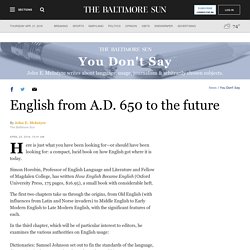

Other use of language. Americanisms. Political correctness. Gender. Accents and dialects. Multicultural London English. Texting and technology. Spelling, punctuation and grammar. Banning, complaining, ruining ...
English from A.D. 650 to the future. Here is just what you have been looking for—or should have been looking for: a compact, lucid book on how English got where it is today.

Simon Horobin, Professor of English Language and Literature and Fellow of Magdalen College, has written How English Became English (Oxford University Press, 175 pages, $16.95), a small book with considerable heft. The first two chapters take us through the origins, from Old English (with influences from Latin and Norse invaders) to Middle English to Early Modern English to Late Modern English, with the significant features of each. In the third chapter, which will be of particular interest to editors, he examines the various authorities on English usage: Dictionaries: Samuel Johnson set out to fix the standards of the language, discovering in the process that the task was beyond him—or anyone. Usage guides: H.W. We Need New Words for New Times But Appealing to Dictionaries Won't Work. In a recent tweet during the voting phase of the recently concluded Lok Sabha elections, Rahul Gandhi posted what appeared to be a screenshot of a page from an online dictionary with an entry for the word “Modilies”.

He claimed the word had been recently added to the English language. The Oxford dictionary’s official handle was quick to refute this claim. Despite the fact that the word was made up, Gandhi’s claim invoked what is generally perceived as the arbiter of proper, correct English usage in India: the Oxford English Dictionary.